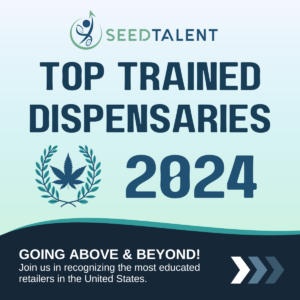Moving the Needle Toward Progress in Cannabis
Although the regulated cannabis industry has existed for more than a decade, the industry is still new to many of the more than 400,000 workers it now employs in the United States. Whether they began their careers in the regulated industry, arrived via the legacy route, or transferred from “traditional” industries, workers are managing a constantly shifting environment with erratic changes in regulations and compliance requirements alongside wildly varying practices across the sector.
Unique Challenges in High-Growth Businesses
The ongoing evolution of the industry presents a unique set of challenges for employers regarding how to:
- Educate the entire workforce in a constantly changing business atmosphere.
- Verify safety and compliance from seed to sale.
- Ensure everyone, from budtenders to C-suite executives, receives the training required to create best-in-class consumer and patient experiences.
Although other fast-growth industries have faced similar issues with worker education, few experienced the combination of accelerated growth, evolving understanding of the core product, and regulatory complexity of cannabis. As a result, there are few roadmaps to follow, but the bottom line remains: Sustainable and healthy development of the industry depends on cultivating an educated, trained, and capable workforce.
As the industry has grown, it has invented, reinvented, and refined policies and processes along the way. The best ways to scale operations for growth are still being developed—and fully adopted industry standards are still lacking from region to region—but a loose system of best practices has begun to emerge. This backdrop exemplifies why identifying the practices, policies, knowledge, and skills that best help businesses succeed is a key component of developing any educational standards. The standards must be linked to industry and organizational key performance indicators to allow all participants to understand the connection between their competency and value creation. Legacy and institutional knowledge ultimately will help fuel growth and sustainability and pave the way for long-term professional development options across job levels.
Navigating Pitfalls to Success
Currently, there is only very limited access to training, and it is difficult for professionals to identify what types of knowledge they need and which provider will give them the highest level of competency applicable to their desired profession. “Elite” courses are available but are cost-prohibitive for most employers and workers.
The pitfalls of varying worker skills and woefully inadequate training opportunities include industry stagnation as well as lost productivity and profits within individual businesses—not to mention long-term effects on consumer engagement and preferences. Standards across the industry are nonexistent or inconsistent at best. Recruitment and retention of employees become more complicated when it is difficult to ascertain the right skills in potential employees or measure performance once they are on the job. Employees experience reduced professional growth opportunities and feel little motivation for advancement. Investors and consumers see businesses in disarray, and the credibility of the entire industry suffers.
So how do we close the knowledge gap in the industry and create a better-educated, more professional workforce? The first step is to incorporate best practices from other industries with those cannabis-specific skills we have identified across the industry. Utilizing this information, we must develop roles-based skill sets specific to the industry for everyone from budtenders to senior-level executives. With role expectations and benchmarks in place, employers can more easily evaluate and confirm required skills in potential employees. In addition, workers and industry professionals can anticipate the necessary skills for jobs, enabling them to be better prepared for success.
Leveraging Assessments to Manage Teams
These role-based competency assessments are critical for the burgeoning cannabis industry to further take flight. The result will be a more stable and professional culture for the industry, which will help combat employee turnover while enhancing the industry’s reputation.
Professionalizing the industry does not mean forgetting about legacy culture, but rather creating an infrastructure where all individuals who want to make cannabis their profession have a real path to do so. The creation of this institutional knowledge will further cement the professionalism of the industry and attract career-seekers instead of just job-seekers. Creating education opportunities based on roles-based skill sets will ensure the industry’s long-term sustainability by helping attract the best talent and providing a path employees can chart to a long, successful career.
Overcoming the existing roadblocks to educating and upskilling the workforce must be a top priority for an industry that is growing at such an unprecedented rate. As acceptance of the plant grows among the public, the industry’s professionalism—or lack thereof—is what can either create loyalty among consumers, employees, and potential employees or reinforce negative stereotypes. Our industry’s most pressing challenges, from price compression and employee turnover to availability of funding, all have roots in a lack of education.
Let us all resolve to dedicate ourselves to furthering education among the cannabis workforce.




